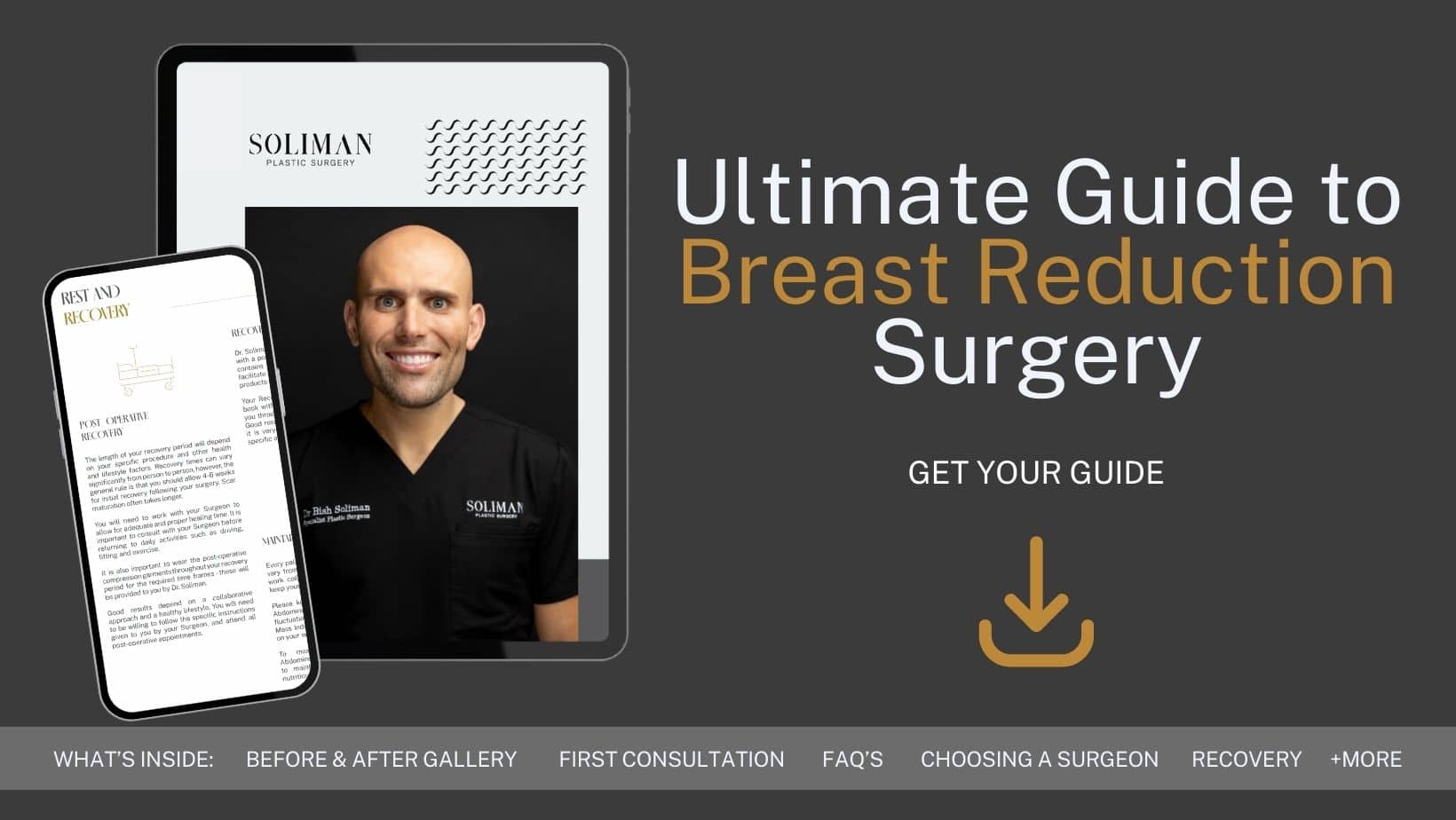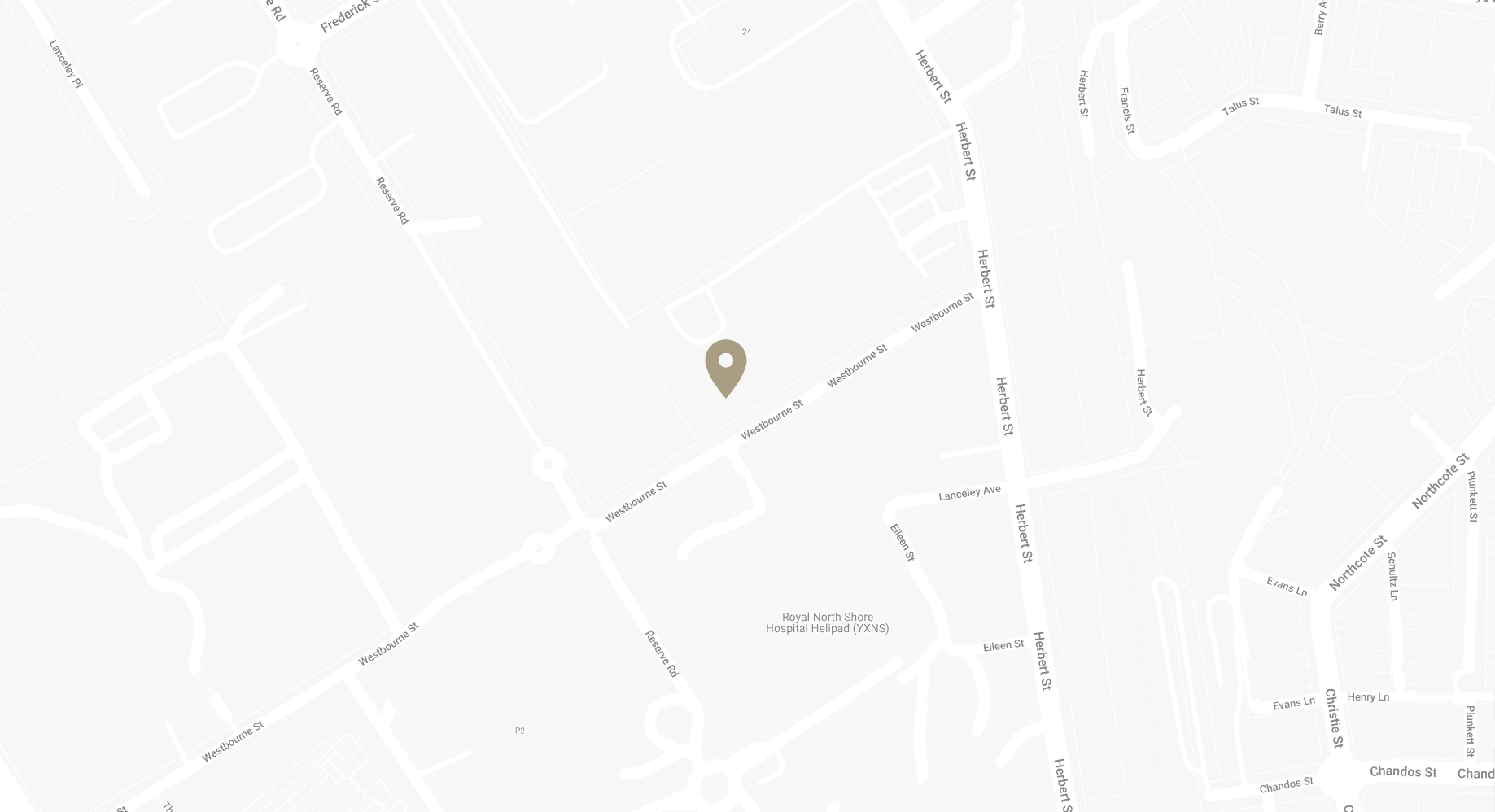Medicare’s Cover for Gynaecomastia Treatment: Eligibility, Process, and Alternatives
Gynaecomastia is a common phenomenon in men, affecting a broad range of ages from infants to older adults. This condition can be the result of hormonal imbalances, with an increase in oestrogen or a decrease in testosterone. It might also arise due to certain medications, medical conditions, or lifestyle factors. For many, the condition is temporary, particularly in adolescent cases where hormonal levels are still stabilising. However, if it persists, medical intervention might be necessary. Treatment options vary based on the underlying cause and can range from medication to surgical procedures. In this blog, Sydney Specialist Plastic Surgeon Dr Bish Soliman offers valuable advice and explains the intricacies of Medicare cover for gynaecomastia surgery.
Download Dr Bish Soliman Breast Reduction Guide

Medicare Australia – A Brief Overview
Medicare Australia is much more than a mere healthcare system; it stands as a fundamental part of the Australian healthcare system and a safety net that guarantees basic health services to all Australians. This system embodies the nation’s commitment to equitable healthcare, ensuring that medical care is a right accessible to everyone, not a privilege. Established to provide affordable and accessible healthcare to all Australian citizens and permanent residents, Medicare covers a wide range of medical services and treatments, all funded by the government. Its role is essential in maintaining the public health of the nation.
Services Covered by Medicare
- Doctor and specialist visits
- Tests and examinations, such as x-rays and pathology tests
- Eye tests performed by optometrists
- Some surgical procedures and treatments
- Partial coverage for prescription medicines under the Pharmaceutical Benefits Scheme (PBS)
Exploring the Medicare Benefits Schedule (MBS)
The Medicare Benefits Schedule (MBS) is an integral part of Australia’s healthcare system. It is a listing of medical services subsidised by the Australian government. The Schedule includes a wide array of services such as consultations, diagnostic tests, and surgical procedures. Understanding the MBS is essential, as it influences decisions regarding treatment options and insurance claims. The MBS functions by assigning a unique item number to each listed service. These item numbers are important for your surgeon when billing for services provided to patients. The government sets a specific fee for each item, known as the ‘scheduled fee.’ This fee represents the amount that Medicare contributes towards the service.
Healthcare providers use these item numbers to claim Medicare benefits on behalf of their patients. Patients can also claim a portion of the costs for services they receive from healthcare providers who do not bulk bill. The MBS ensures that a significant part of medical costs is covered, thereby reducing the financial burden on patients.
Gynaecomastia Surgery: When Is It Medically Necessary?
Understanding when this surgery is deemed medically necessary, as opposed to being purely cosmetic, is crucial for individuals considering this option.
Scenarios Where Gynaecomastia Surgery Is Considered Necessary
- Persistent pain or discomfort in the breast area.
- Presence of malignant or suspicious lumps that require surgical intervention.
- Prolonged psychological distress or social embarrassment due to the enlarged breast tissue.
- Failure of medical management, where prescribed medications have not effectively reduced the breast size.
- Cases where gynaecomastia is linked to other underlying health conditions requiring surgical treatment.
It is essential to recognise that not all cases of gynaecomastia necessitate surgery. In many instances, particularly during adolescence, the condition resolves on its own without any intervention. However, when symptoms persist, surgical options are explored.
MBS Item Number 31525
MBS Item 31525 is a specific category within the Medicare Benefits Schedule in Australia, dedicated to the surgical treatment of gynaecomastia. Understanding this item and the eligibility criteria for Medicare coverage is essential for anyone considering gynaecomastia surgery.
Item 31525 is detailed in its criteria and specifications, ensuring that Medicare support is provided for medically necessary cases of gynaecomastia surgery. This distinction is key to understand for both patients and your surgeon.
Criteria and Specifications of MBS Item 31525
- Confirmed diagnosis of gynaecomastia through clinical assessment.
- Documentation of persistent gynaecomastia despite non-surgical interventions.
- Evidence of significant physical discomfort or psychological impact due to the condition.
- A recommendation from a qualified medical practitioner that surgery is the most appropriate treatment.
- Ensuring that all other medical conditions that could contribute to gynaecomastia are adequately managed.
These criteria serve to ensure that Medicare funding is allocated to cases where surgery is a medical necessity rather than a cosmetic choice. This distinction is crucial in the healthcare system.
This specific item dictates the extent of coverage provided by Medicare for such procedures, as well as any limitations or exclusions that apply.
Limitations and Exclusions
While Item 31525 provides coverage for gynaecomastia surgery, there are specific conditions and limitations attached to this coverage:
- Coverage is only available when the surgery is deemed medically necessary.
- Cosmetic procedures for gynaecomastia are not covered under this item.
- Pre-existing conditions or complications that may arise not directly related to the treatment of gynaecomastia might not be covered.
- Specific criteria must be met, as outlined in the Medicare Benefits Schedule, for the surgery to be eligible for coverage.
Understanding these limitations and exclusions is crucial as it influences both the decision to proceed with surgery and the financial planning involved.
Navigating the coverage provided under Item 31525 requires a clear understanding of the Medicare system:
- Consult with your GP as you will need a referral for Dr Bish Soliman.
- Ensure that all the necessary documentation is in place to meet the eligibility criteria.
- Be aware of any potential out-of-pocket expenses that may not be covered by Medicare.
- Consider consulting with a financial advisor or healthcare navigator to fully understand the financial implications of the surgery.
What If Your Surgery Isn’t Covered?
In scenarios where Medicare does not provide coverage for gynaecomastia surgery, it’s important to be aware of the alternative options available. These alternatives can range from private insurance to self-funding, each with its own set of considerations.
When Medicare does not cover gynaecomastia surgery, the following options can be explored:
- Private Health Insurance: Some private health insurance plans offer coverage for surgical procedures not covered by Medicare. It’s essential to check with your insurance provider regarding the specifics of your coverage, including any waiting periods or exclusions that might apply.
- Payment Plans and Medical Loans: Some clinics offer payment plans, allowing you to pay for the surgery in instalments. Additionally, medical loans can be an option, although it’s crucial to thoroughly understand the terms and interest rates before committing.
- Superannuation Funds: In certain circumstances, you might be able to access your superannuation fund early to pay for medical procedures. This option requires meeting specific criteria and is generally considered as a last resort.
These alternatives require careful consideration, particularly in terms of the financial implications and the quality of medical care.
Private Insurance for Gynaecomastia Surgery
Private health insurance can be a viable option, but it comes with its own set of challenges:
- Reviewing and understanding the extent of your coverage.
- Being aware of any waiting periods that might apply for coverage of pre-existing conditions.
- Ensuring that your chosen healthcare provider and hospital are covered by your insurance plan.
- Considering additional costs like co-payments or deductibles that may not be covered by the insurance.
Considerations for Self-Funding
Choosing to self-fund the surgery involves several key considerations:
- Assessing your financial situation to determine if self-funding is feasible.
- Exploring various financing options, including savings, loans, or payment plans.
- Understanding the full cost of the surgery, including any associated expenses like post-operative care or potential complications.
- Considering the long-term financial impact of this decision.
FAQs about Medicare and Gynaecomastia Surgery?
What does Medicare cover in terms of gynaecomastia surgery?
- Medicare may cover gynaecomastia surgery under specific circumstances. This coverage is generally provided when the surgery is deemed medically necessary, as outlined in the Medicare Benefits Schedule, particularly under Item 31525. The coverage typically includes the surgical procedure.
How do I know if my gynaecomastia surgery is eligible for Medicare coverage?
- Eligibility for Medicare coverage is determined based on specific criteria. These include a confirmed clinical diagnosis of gynaecomastia, evidence that the condition has not responded to non-surgical treatments, and substantial physical discomfort or psychological impact.
Can I use Medicare for gynaecomastia surgery if it is for cosmetic reasons?
- No, Medicare coverage for gynaecomastia surgery is typically not available if the surgery is purely for cosmetic reasons. Medicare provides coverage only when the surgery is considered a medical necessity, which means it must address significant health issues or symptoms related to gynaecomastia.
What are my options if Medicare doesn’t cover my gynaecomastia surgery?
- If Medicare does not cover your surgery, alternative options include private health insurance, self-funding, payment plans, medical loans. It’s important to review these options carefully, considering factors such as cost, coverage extent, and the quality of healthcare.
Do I need a referral from a GP to get Medicare coverage for gynaecomastia surgery?
- Yes, a referral from a General Practitioner (GP) is required to access specialist services, like those of a surgeon such as Dr Bish Soliman, under Medicare. The GP will assess your condition and refer you to a specialist, who can then determine your eligibility for surgery under Medicare. This referral is a crucial step in the process of obtaining Medicare support for the surgery.
Further Reading about Male Procedures with Sydney Specialist Plastic Surgeon Dr Bish Soliman
- Read more about Preparing for Gynaecomastia Surgery (Male Breast Reduction)
- Read more about How to Minimise Scars after Gynaecomastia
- Read more about How Is the Recovery after Gynaecomastia?
- Read more about Body Contouring Surgery Sydney
- Read more about Excess Skin Removal (Body Contouring after Weight Loss)
Medical References about Gynaecomastia Surgery
- Surgical Management of Gynaecomastia: An Outcome Analysis – PubMed
- Enlarged breasts in men (gynaecomastia) – Mayo Clinic
- Trends in the Surgical Correction of Gynaecomastia – NCBI
- Gynaecomastia: Surgery, treatment, causes, and symptoms – Medical News Today
- Gynaecomastia Surgery (Male Breast Reduction): What to Expect -Cleveland Clinic



